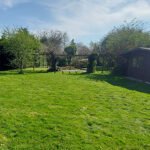Preparing an Allotment for the Growing Season – Rotovating & Soil Enrichment
Spring is just around the corner, and that means it’s time to get the soil in top shape for the growing season. One of my recent jobs took me to a local allotment where the goal was to prepare the ground for planting by rotovating and enriching the soil with organic compost and blood, fish and bone meal.
Preparing an Allotment for the Growing Season – Rotovating & Soil Enrichment
The allotment hadn’t been worked for a while, so the soil was compacted and full of old root systems and surface weeds. I started by using a rotovator to break up the top layer of soil. This process helps improve drainage, aerates the ground, and makes it easier for roots to establish when planting time arrives.
Rotovating is one of those jobs that looks easy, but it’s all about knowing how deep to go and when to make multiple passes to get the best texture without overworking the soil.
Enriching with Organic Matter
Once the ground was loosened up, I spread a generous layer of well-rotted organic compost across the area. This adds essential nutrients back into the soil and boosts the microbial life that keeps plants healthy and resilient.
To really give the soil a boost, I also mixed in blood, fish and bone meal – a natural, slow-release fertiliser packed with nitrogen, phosphorus, and potassium. It’s ideal for supporting root development and early plant growth, especially in vegetable beds.
Why This Matters
Healthy soil is the foundation of any successful garden or allotment. By taking the time now to rotovate and feed the ground, we’re setting the stage for a productive and easy-to-manage plot throughout the year.
Whether you’re planning to grow vegetables, fruit, or flowers, good preparation goes a long way.


